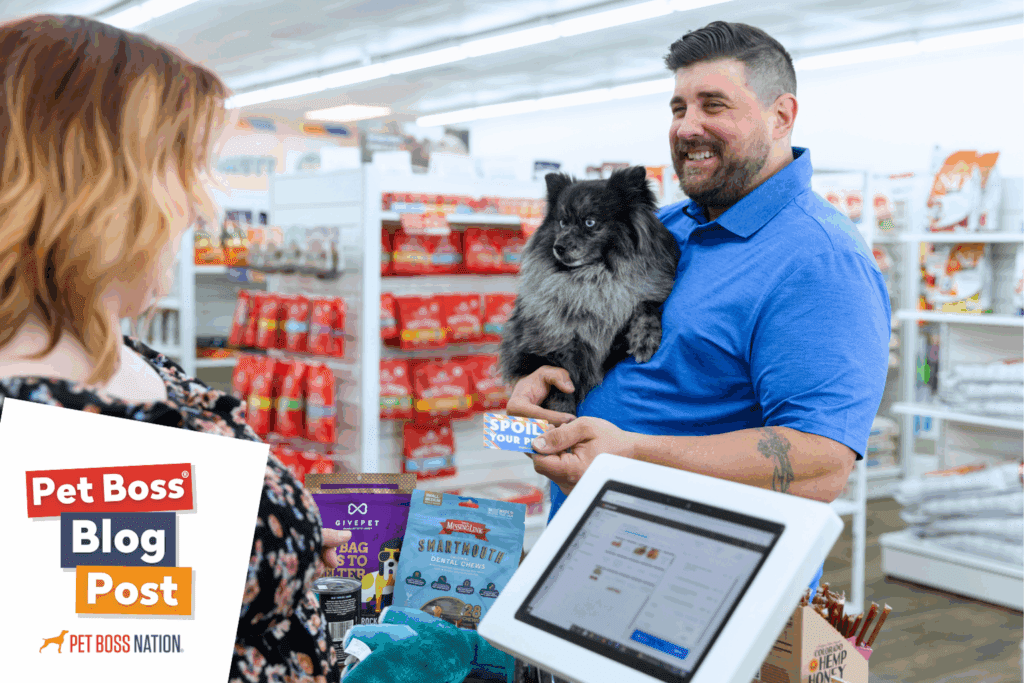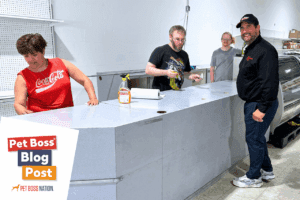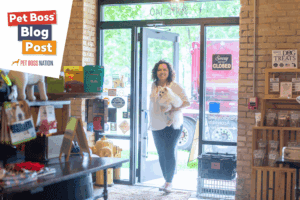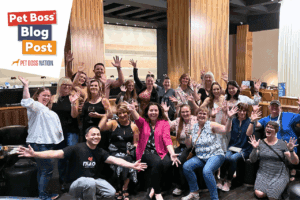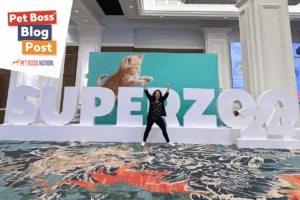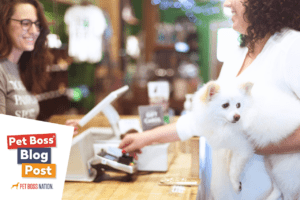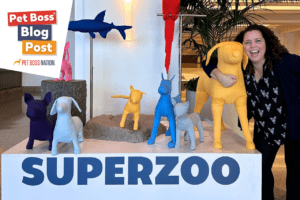If you’ve been running a pet business for any length of time, you know the feeling…
One day everything’s humming along smoothly, and the next day you’re dealing with supply shortages, price increases, or a brand you carry suddenly appearing in every big box store in town.
Sound familiar?
Maybe it’s that dog food you’ve been championing for years that just announced a direct-to-consumer subscription service. Or maybe it’s new regulations that just changed everything about how you can market your services. Or maybe it’s something as simple as your top-selling toy being recalled right before your busiest season.
Welcome to the reality of running a pet business. Disruption isn’t the exception—it’s the rule.
But here’s what Candace D’Agnolo, our CEO of Pet Boss Nation®, has learned after starting, scaling, and selling multiple pet businesses:
The entrepreneurs who not only survive but absolutely thrive in this industry are the ones who’ve mastered the art of the pivot.
And as a small, independent pet business owner? You’ve got a secret weapon that the big players can only dream of having.
Your Indie Pet Retailer Superpower: The Ability to Pivot Fast
Let’s talk about what makes independent pet business owners absolutely unstoppable when disruption hits. While corporate chains are stuck in committee meetings, waiting for approval from five different departments, and dealing with red tape, you can literally transform your business overnight.
And we don’t mean in a chaotic way. We mean in a powerful way.
When COVID-19 hit and everything shut down, who adapted faster? The massive pet retail chains who needed direction from higher-ups, or the scrappy independent shop owners who immediately pivoted to curbside pickup, started offering virtual consultations, and created DIY grooming kits for anxious pet parents?
I watched hundreds of pet business owners completely reinvent their operations in a matter of days. They saw what their customers needed and they delivered.
That kind of agility is your competitive advantage!
The Emotional Side of Business Disruption (and Why It’s Holding You Back)
Disruption can impact your business model AND challenge your emotions (rightfully so!)
When a brand you’ve supported for years suddenly pops up on Amazon with prices you can’t match, it feels personal. When a manufacturer you’ve built a relationship with decides to go direct-to-consumer, it can feel like a betrayal. When industry changes seem to happen faster than you can keep up with, it’s easy to feel overwhelmed and frustrated.
But sometimes it’s our emotional reaction to disruption that slows us down more than the disruption itself.
That brand going to Amazon? It’s not personal—it’s just business. They’re evolving to stay competitive in their market, and we need to do the same in ours. The manufacturer cutting out the middleman? They’re adapting to consumer demands, and we can adapt too.
The key is shifting your focus from frustration to forward motion. Instead of asking “Why is this happening to me?” start asking “How can I turn this into an opportunity?”
What We Can Learn From Disruption
Let’s take a quick walk down memory lane and look at some of the major disruptions our industry has faced in recent years, and how smart pet business owners turned challenges into opportunities:
The tariff situation: When tariffs started fluctuating this year, some pet business owners thought it was game over. But the savvy ones sourced domestic alternatives, educated customers on the value of buying local (even at higher prices), and actually strengthened their customer relationships in the process. Some even used it as an opportunity to highlight the superior quality of American-made products they’d been wanting to promote anyway!
The COVID-19 pandemic: This was the ultimate test of adaptability. While everyone was panicking about lockdowns, creative pet business owners were launching new services left and right. Virtual training sessions, contactless delivery, subscription boxes for pet supplies, online grooming tutorials…the list goes on.
Brand shifts to mass market: When brands started appearing in big box stores, instead of competing on price (a losing game), smart pet business owners doubled down on what made them different: personalized service, expert knowledge, community connection, and curated product selection. They helped customers understand that they weren’t just buying a product—they were buying an experience and relationship.
Supply chain disruptions: Many pet business owners have seen disruptions in supply chain, and they saw it as an opportunity to introduce customers to new brands, showcase local suppliers, and demonstrate the value of diversified inventory. Some pet business owners even discovered that their “backup” products actually performed better than their original go-to options.
Each of these challenges proved the same thing: independent pet business owners know how to adapt. Not just to survive, but to come out stronger on the other side.
What to Do When Disruption Hits Your Pet Business
So what should you do when the next wave of disruption inevitably arrives? Here’s your action plan:
Audit your vulnerabilities before you need to. Take a hard look at your supply chain, your key revenue streams, and your customer base. Where are you most at risk? What would happen if your top-selling product line disappeared tomorrow? Having this awareness allows you to build contingency plans before you need them.
Build strategic partnerships. Your distributors, manufacturers, and even fellow pet business owners can be invaluable allies when things get tough. Cultivate these relationships during good times so you can lean on them during challenging ones. Sometimes the solution to your problem is someone else’s opportunity.
Stock strategically, not fearfully. When disruption hits, the temptation is either to panic-buy everything or freeze up and buy nothing. Neither approach serves you well. Focus on your proven top sellers, products with long shelf lives, and items that solve ongoing customer problems rather than trends that might fade.
Stay obsessively close to your customers. They’ll tell you what they need, what they’re willing to pay for, and what problems they’re facing. Sometimes the biggest opportunities come from simply listening to customer complaints and figuring out how to solve them.
Communicate with radical transparency. When things get uncertain, your team and customers crave honesty. Be upfront about challenges, explain your solutions, and let people know how they can help. Transparency builds trust, and trust builds loyalty.
Focus relentlessly on your unique value. What do you offer that nobody else can? Is it your expertise? Your personal relationships with customers? Your ability to curate exactly what your local market needs? Double down on what makes you irreplaceable.
Build a Mindset That Can Handle Disruption
Successful pet business owners stay curious about industry trends, experiment with new ideas before they have to, and view disruption as a competitive advantage rather than a threat.
They understand that being small isn’t a disadvantage, it’s your superpower.
So what’s your next move? Start by shifting your perspective. Instead of dreading the next industry shake-up, start preparing for it. Build your pivot muscles now, while things are stable, so you’re ready to flex them when you need to.
Ask yourself these questions:
🤔 What would I do if my best-selling product line disappeared tomorrow?
🤔 How could I serve my customers in a completely different way?
🤔 What new problems are my customers facing that I could solve?
🤔 What would I do if I had to rebuild my business from scratch today?
The answers might surprise you (and might reveal your next big opportunity!)
Remember: when the pet industry shifts again (and it absolutely will), the ones who thrive will be those who see change not as a threat, but as their next big move. 😉
Want to connect with other pet business owners who are mastering the art of the pivot? Join the Pet Boss Nation® community where we share strategies, support each other through industry changes, and celebrate the wins that come from thinking differently.

